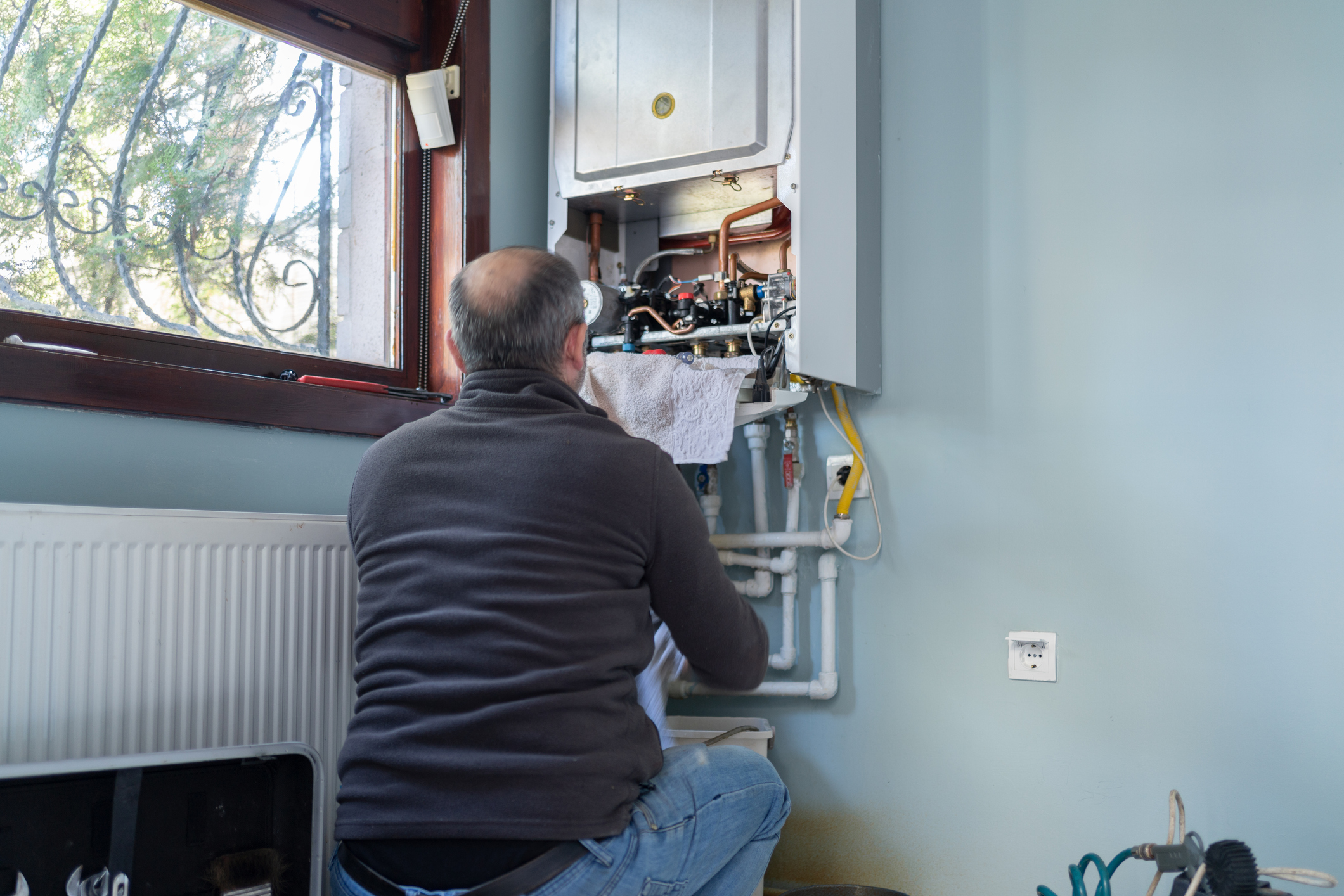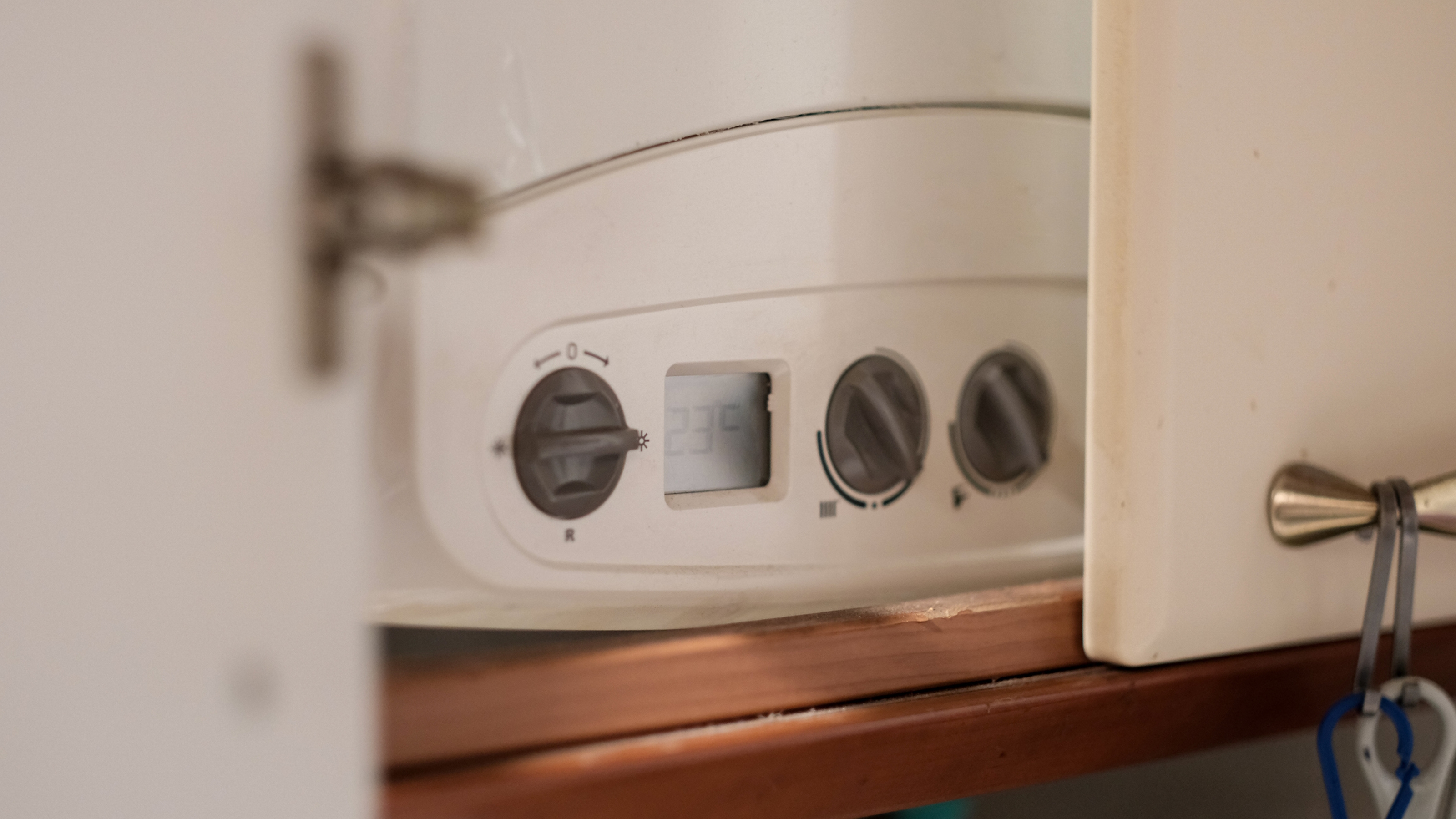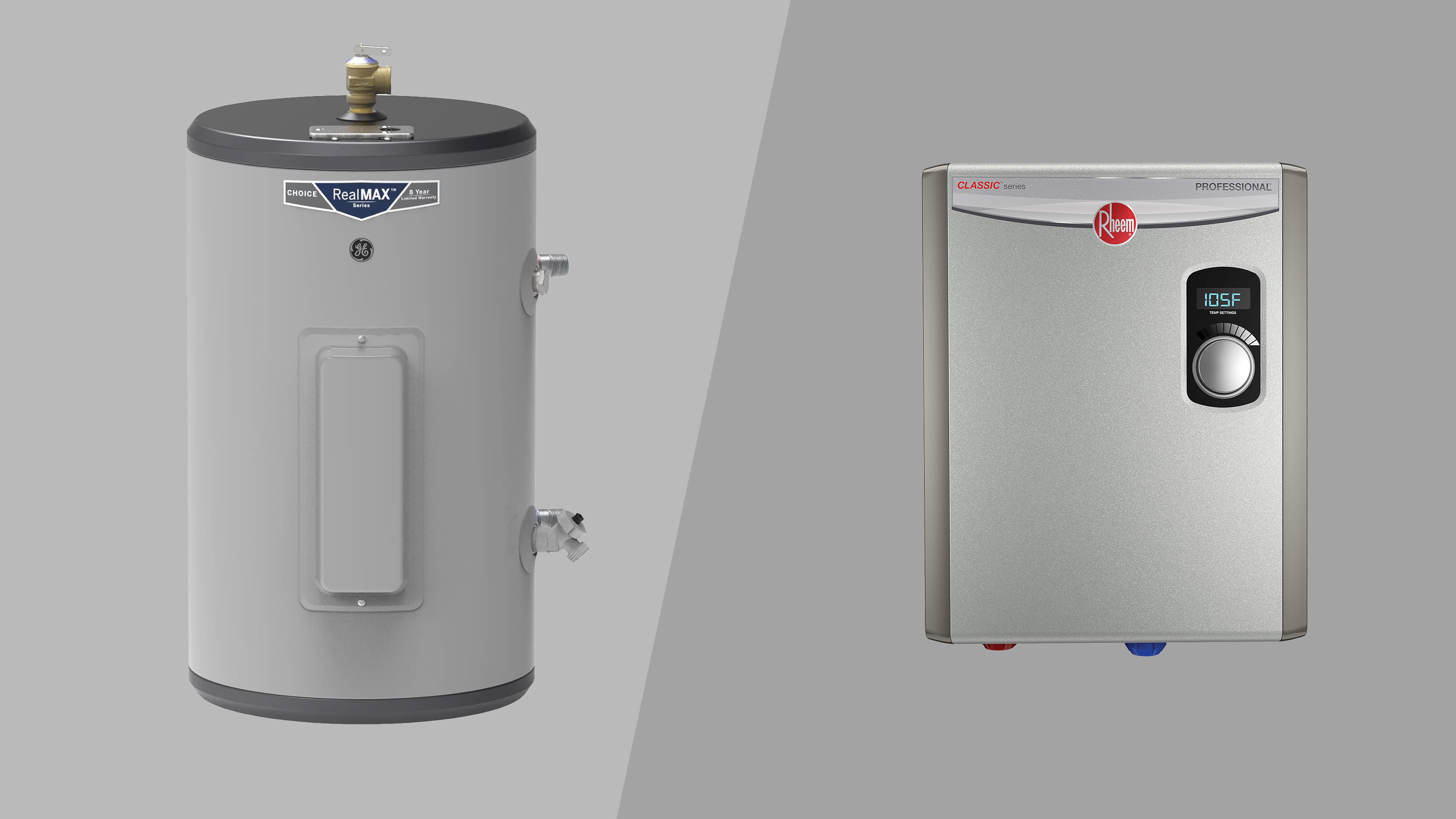Since the invention of domestic water heaters in the late 1800s, most of these appliances have used a tank to store heated water. Whenever you’ve turned on a hot tap to wash your hands or fill a bathtub, the water will likely have flowed from a water heater’s tank.
However, tankless water heaters are an increasingly popular alternative to the best traditional tank heaters. They offer households effective, efficient heating in a package that can be as small as a suitcase.

Micheal Faraone is a Virtual Plumbing Expert with Frontdoor. The Frontdoor team of expert advisors are available seven days a week to help app users with any home care or maintenance issue, including water heater installation and maintenance.
“Tank water heaters heat water in advance and store it in a large tank, typically ranging from 20 to 80 gallons, usually with a heating element or burner located at the bottom of the tank,” says Michael Faraone, a Virtual Plumbing Expert at Frontdoor.
“Tankless water heaters are different, as they heat water on demand as it flows through the unit,” he says.
“They use high-powered burners or heat exchangers to heat the water as it passes through quickly.”
Together with Gary McCoy, a Lowe’s Store Manager, Michael will discuss the pros and cons of tank and tankless water heaters in terms of price, features, and performance.
You can expect to leave with a clearer idea of which type of water heater is best for you and your home: a tankless water heater or a traditional heater with a tank.

Gary McCoy is Store Manager of a Lowe’s hardware store location in Charlotte, North Carolina. As one of the leading home and garden brands in the United States, Lowe’s sells a wide variety of water heaters, including tankless and tank models.
Tankless water heater vs. traditional water heater: Price and value
Regarding up-front costs, a traditional water heater will always be cheaper than a tankless system. For example, this 50-gallon A.O. Smith tank model costs $559 at Lowe's, while the similarly rated A.O. Smith Signature Series 10-GPM Tankless water heater costs $1,659.
On Amazon, the GE Appliances 10 Gallon Versatile Plug and Play Electric Water Heater costs $299, while the Rheem 18kW 240V Tankless Electric Water Heater is $449 at full price.
Furthermore, contractors will usually charge higher prices for installing tankless heaters due to the added complexity and difficulty of installation.
“The initial installation cost of a tankless water heater can be high, particularly for gas models, which may require additional venting or upgrades to your gas line,” says Lowe’s Store Manager Gary McCoy.
The flip side to these higher up-front costs is that tankless water heaters often have better longevity.
“Tank water heaters typically last around 8 to 12 years with proper maintenance, while tankless water heaters generally have a longer lifespan, often around 20 years or more,” says Michael.
So, while tankless water heaters cost much more up-front, their (typically) greater lifespan offsets the price difference to some extent.
Some ongoing financial factors complicate the debate on water heater price and value. Tankless heaters usually have higher yearly maintenance costs than tank models, as they are more susceptible to issues like mineral buildup. However, tank models are less efficient than tankless heaters, making them more expensive daily.

Tankless water heater vs. traditional water heater: Features and design
In terms of design, the major advantage of a tankless water heater is that it’ll take up far less space than a model that does feature a tank. Choosing a tankless model can make a room such as a kitchen feel much larger, freeing up usable space for another appliance or a cabinet.
Another benefit of a tankless water heater is that there’s no tank to clean or maintain!
“Tank heaters often require regular maintenance to remove dirt, while tankless heaters have a longer life span and do not need to be cleaned often,” says Gary.
So, a water storage tank means more – but there are a few advantages to the familiar design of a traditional tank water heater.
“Traditional water heaters (with a tank) are easy to use and maintain, and they come in various sizes, so you can choose one that fits your household’s hot water needs,” says Gary.
“Since they store hot water in the tank, you can use it immediately without waiting for it to heat up, which makes this type of heater ideal for large families with high water usage.”

Tankless water heater vs. traditional water heater: Performance
Most tankless and traditional water heaters perform effectively, provided they are properly installed and maintained. The average model will give you hot water when you need it, in almost every normal usage scenario.
However, tankless and traditional water heaters have some relative performance downsides.
“Tankless heaters might struggle to supply consistent water temperature when multiple taps are used simultaneously,” says Gary.
“Meanwhile, if the tank of a traditional heater is not filled in a timely manner, it might run out of water or require a waiting time to fill.”
Traditional heaters have a few additional limitations.
“Their efficiency is not as good as tankless water heaters because they continuously keep the water hot, leading to higher energy bills,” says Gary.
This is one of the key performance benefits of a tankless water heater: the appliance only uses energy to heat water when hot water is actually required.
Tankless water heater vs. traditional water heater: what the experts say
Lowe’s Store Manager Gary says buyers should consider their household water usage and family size before choosing between a tankless or traditional water heater.
“Due to a high consumption rate, homes with more than four members should look for a tank water heater as their best option,” says Gary.
“Tankless heaters are usually preferred for smaller households or ones with less simultaneous usage.”
On the other hand, smaller or energy-conscious homes should consider a tankless water heater as the more efficient choice.
“Tankless water heaters are compact, making them perfect for smaller homes or apartments,” says Gary.
“They are also more energy-efficient as they only heat water when needed, whereas tank heaters constantly keep water hot, which can lead to higher energy bills.”
Of course, whether or not a heater has a tank is not the only variable that will affect a heater’s suitability for your home.
“Ultimately, the best choice depends on your needs, budget, and space constraints,” says Michael.
“There are several technical differences between water heaters beyond just the presence of a tank.”
Tankless water heater vs. traditional water heater: which is best?
According to Frontdoor’s Michael Faraone, the advantages of traditional tank water heaters are their lower initial cost, simple installation, lower maintenance requirements, and readily available hot water supply.
However, Michael notes that tank water heaters have relatively poor energy efficiency, a shorter lifespan, and more significant space requirements.
Tankless water heaters have disadvantages, including higher up-front costs and installation requirements and more complicated maintenance in the long term. But Michael highlights some major advantages to a tankless heater in day-to-day use, including their superior energy efficiency, theoretically unlimited hot water supply, and space-saving potential.
In summary, if you’re willing to take a hit on upfront costs and ongoing maintenance, a tankless water heater could provide the best value-for-money, performance, and space efficiency in the long term. Traditional tank water heaters are a simpler option that won’t require you to spend a large amount of money up-front or on maintenance.
Tankless water heater vs. traditional water heater: FAQs
Can you install your own water heater?
“You may be able to install some electric water heaters yourself, but first check national and local codes (e.g., building, electrical, plumbing, gas), as these may require that a licensed professional handles water heater installation,” says Gary.
“Follow the codes for your area and the instructions for your appliance. Lowe’s offers professional installation options for most new units if you are uncomfortable installing a water heater yourself.”
If you plan on installing your water heater, then your choice between a tankless or traditional model will affect the difficulty of installation. Installing a tank water heater is within the capabilities of some confident home improvers. At the same time, tankless models are more advanced and have a higher number of components, so they’re a challenge even for some professional installers.
What other factors should you consider when choosing a water heater?
The choice between a tank or tankless model is just one factor to consider when buying a new water heater.
Another important variable is the power source, usually gas or household electricity. A gas-powered water heater is typically cheaper than an electric model. In contrast, electric water heaters are more convenient to install at a property that doesn’t have an available gas connection. Meanwhile, heat pumps and solar-powered water heaters can offer ecological and cost benefits for homes in well-suited locations.

